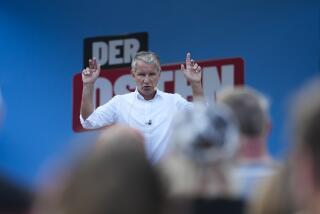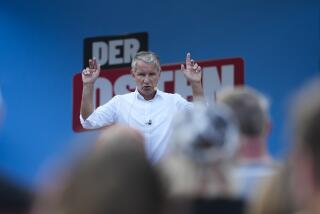Undecided Voters in the East Are Key to Kohl’s Political Fate
DRESDEN, Germany — To find the “blossoming landscapes” of the new eastern Germany that Chancellor Helmut Kohl promised when he last ran for reelection, one must first negotiate much rust-belt wreckage and weed-choked wasteland.
Only a few minutes’ drive beyond the sleek new office towers and bustling construction sites of Dresden, Leipzig and Berlin, the veneer of eastern equality thins to reveal remnants of the Communist-era German Democratic Republic: prison-like workshops, rusted metal machinery, faceless blocks of shoddy housing dubbed “worker boxes” by their unhappy occupants.
But in this blighted heart of East German industry, the first tender shoots of an economic turnaround are apparent, even if voters are too disillusioned with the slow rewards of reunification to pay much attention.
Kohl’s campaign strategy for the Sept. 27 federal ballot in which Europe’s longest-serving elected leader is seeking an unprecedented fifth term has been to remind voters that building a strong and united Germany is, by necessity, a work in progress.
And while polls show that Germans want a change in chancellors after 16 years of Kohl, the plodding incumbent has been gaining ground on his younger and more lively opponent, Social Democrat Gerhard Schroeder. Few are now so daring as to exclude the possibility of another Kohl comeback.
Kohl’s electoral fortunes got a boost Sunday when Bavarians gave his sister party, the Christian Social Union, an unexpectedly solid majority despite a costly barnstorming of the conservative heartland by Schroeder. Polls have since shown that Kohl has cut his lag behind his younger opponent to 3 or 4 percentage points from 6 last week and as much as 20 earlier this year.
The chancellor won his fourth term in 1994 by virtue of his popularity among eastern German voters--the very members of the electorate now telling pollsters that they have had enough.
Resentment Rife
It is here in Saxony and in the four other states jaggedly sewn to the prosperous western regions in 1990 that unemployment has risen to nearly 20%, the highest level since the despair of the 1930s gave rise to the Third Reich.
With so many citizens of the “new states” out of work, and many of those with jobs accorded pay and status far below that of their western counterparts, resentment is rife in the east.
But against the bleak backdrop of unfulfilled promises of prosperity and uneven recognition of the easterners’ role in shaping a new Germany, a strange social phenomena has emerged that may give Kohl more support from among the struggling “Ossies” than opinion polls are projecting.
Wages here are 72% of western German levels, and benefits are often fewer, but those disparities are now being touted as a competitive advantage. The lower costs have attracted major investments in Saxony by technological giants such as Motorola, Siemens and Advanced Micro Devices Inc. of Sunnyvale, Calif.
“Eastern Germans are taking pride in their greater competitiveness and attractiveness to big investors. There’s definitely a sense emerging of ‘Let’s really show those Wessies,’ ” said Hans Christoph von Rohr, head of the federal Industrial Investment Council, who sees a positive energy emerging from the inter-German rivalry.
Martin Gillo, a native Saxon who is personnel director for the new plant run by the Sunnyvale firm, insisted that the imbalances have become a source of self-confidence in this high-tech enclave dubbed “Silicon Saxony.”
“Eastern Germans are not bothered by this discrepancy. They are rather proud of being more attuned to the realities of competitiveness than the western Germans,” Gillo said. “It’s the westerners who should be worried that their advantages will disappear over time.”
Although eastern dissatisfaction over high unemployment has driven voters to contemplate opting for Schroeder, Germany’s social welfare system ensures that the jobless still make their rent payments and keep sausage and beer on the table.
Cushioned by benefits that no other former Communist citizenry could dream of, a sentiment is gathering force among the easterners that a change of leadership simply for change’s sake could scuttle the modest advances achieved in the eight years since unification.
Kohl has been boasting of “the turning tide” since the Bavarian state election and his rise in the polls.
Ralf Weidner, a political advisor to Kohl, contended that the huge undecided vote--40%, by some estimates--could shift the tightening contest in Kohl’s favor.
“Only 25% or 30% of Germans polled say they like the chancellor, while 60% say they like Schroeder,” Weidner said. “But voters here put a lot less stock in charisma and personality than they do in a party’s platform content, and we’re counting on their shrewd assessment of policy to win the election.”
Perhaps reluctantly, but ever more perceptibly, voters in the eastern states are acknowledging that they may be more comfortable with the governing devil they know than with the unknown quantity of Schroeder.
With opinion polls indicating that the Social Democrats’ lead over Kohl’s more conservative Christian Democratic Union has narrowed, many eastern Germans do appear to be rethinking their choices.
“Don’t count him out,” said Hermann Wolf, who with 25 co-workers from a defunct East German factory built a multimillion-dollar enterprise that was recently acquired by the Connecticut-based firm Photronics. “No one wants to admit he’s willing to vote for a chancellor who has been bad-mouthed since the last election, but balloting is a private affair, and each voter can crawl back to his comfort zone in secret.”
Saxony has measurably benefited from a healthy share of the $640 billion in investments made in the eastern regions since reunification, a transfer of about 5% of the total wealth of the former West Germany, said Hagen Graf Lambsdorff, head of foreign affairs for the federal government’s information office.
While the number of new, high-tech jobs in Saxony remains small, about 20,000 local managers contend that those jobs support at least three times as many new positions in service industries and suppliers.
So why, if business is booming and the prospects for more investment in the east are so bright, are Saxons as disgruntled as other easterners with the Kohl government?
“There is a lot of resentment here over the lack of recognition of many eastern Germans’ professional credentials, which is why you have highly trained engineers working below what they consider their capacity,” said Franz Henne, a U.S.-educated economics advisor to the Saxony state government. “People here say they feel like second-class Germans.”
But like the salary and benefits disparities, the perception of the unemployment problem also is wrong, Henne said, noting that most of the eastern German jobless are women, who were compelled to work in the Communist era.
“More than 90% of women in the GDR worked, compared with about 65% of West German women,” Henne said. “Many of those registered as unemployed may never return to the work force as eastern social values become more similar with the west.”
Painful Reforms
Kohl’s shaky standing among easterners also is a predictable consequence of the painful reforms carried out under his watch, employers say.
“People blame the forced structural changes that had to occur on the government that happened to be in power. This is a natural reaction,” said Linden Blue, a 35-year-old entrepreneur whose chemical and environmental restoration projects employ 700 Saxony residents. “Also, Kohl has been in there a long, long time. Even colleagues who want to vote for the CDU say they are tired of leaders staying in power until they can’t even walk.”
That is one legacy of the Communist era that might hurt the 68-year-old Kohl in the contest against an opponent 14 years his junior: Most eastern voters still remember the doddering last days of East German leader Erich Honecker and the other leaders-for-life who ruled Eastern Europe when it was politically tethered to the Soviet Union.
But while Kohl’s legendary girth and post-retirement age might throw into question his longevity in contrast with Schroeder’s, he has campaigned as actively as his younger opponent, if more aloofly than the media-savvy Schroeder.
“I’m sick of Kohl, but I don’t see that Schroeder is any better,” said Bernd Richter, who runs a small taxi service here with his sons. “People say they want a change, but they said that last time. Another decade is what we need for more prosperity, and neither party can change that.”
Kohl’s political allies in the eastern states blame the short memories of voters for the chancellor’s showing in the polls.
“People here seem to have forgotten what our lives were like,” said Arnold Vaatz, a Communist-era dissident now serving as Saxony’s minister for environment and development. “Since reunification, 11,000 kilometers [6,820 miles] of new highways have been built, the entire telephone network has been replaced, polluted industrial sites have been cleaned up and eastern Germans are now fully integrated into the western German social security system.”
More to Read
Sign up for Essential California
The most important California stories and recommendations in your inbox every morning.
You may occasionally receive promotional content from the Los Angeles Times.











